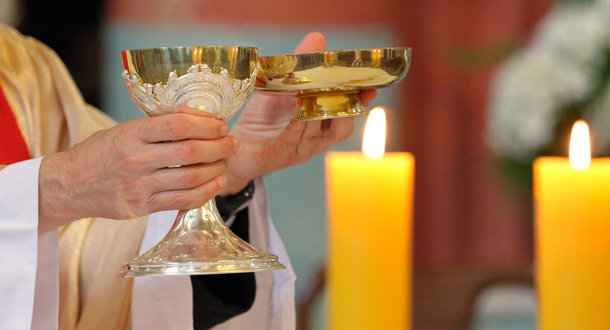
Scripture:
Reflection:
Decades ago, on cool May mornings with the smell of honeysuckle in the air, my grandmother and I walked a mile on a narrow rural road in Indiana to attend Mass at her parish. That small brick church still sits atop a steep hill circumscribed by the graves of generations of the faithful, including my immigrant ancestors, and now my grandmother.
At Mass we sat close. She carried a deep reverence for the space and the ritual. Her bread, the Eucharist, no doubt sustained her during illnesses, the Great Depression, two world wars, family crises, and her inner wrestling matches with the Devil.
The impressions left by these special moments in church with her has given me a deep reverence for the Mass. The food that nourishes our life with Christ is found, among other places, in the “source and summit” of our faith: the Eucharistic celebration.
In today’s Gospel Jesus tells us He is the bread that gives life to the world. Belief in Him is transformative, just like a nutritious, balance diet can transform a sick, malnourished body.
We live in difficult times. Giving in to the noises and demands of a media-saturated world swirling around us can make us feel inadequate, confused, off-centered, and starving for meaning. We easily can succumb to the belief that strength will save us, that performance will make us valuable, and that “the idol of individualism,” in the words of Capuchin Franciscan Roberto Pasolini, “must be worshiped.”
The Bread of Christ counters each of these myths. Jesus teaches that moments of passivity and defeat is where we find fulfillment. When we surrender our lives to Christ, we learn that great accomplishments, power, prestige, and autonomy will never fulfill our unrelenting, deep hunger for meaning.
Meaning is found in experiencing the grace, whether in the Eucharist or in other encounters with Christ, to transform our limitations into opportunities for connecting with others in loving, forgiving relationships. This leads us to be as bold as Stephen in speaking truth to people who, as Stephen found out, might be “infuriated” and “grind their teeth” at us.
Fr. Roberto says, “The cross is the only possible direction of our lives. When pain, fatigue, loneliness, or fear lay us bare, we are all tempted to shut down, to stiffen up, to feign self-sufficiency. During these moments the truest love becomes possible, when one does not impose oneself, but allows oneself to be helped . . . We need to abandon all pride, but also the illusion that we can save ourselves with our own strength.”
These are bold, counter-cultural words. Speaking them aloud and letting ourselves be transformed by them will lead to unknown ends.
We need the Bread of Christ to fuel us for the disappointments and temptations of daily living. Praying over His words, attending to our community liturgies, living humbly, spending time with the crucified of today . . . the elderly, sick, poor, mentally ill, addicted, frightened, dishearten, confused, wayward, arrogant, and shallow . . . is where we find Christ, our Bread of Life, as much as my grandmother and I found Him in that little country church so many years ago.
Jim Wayne is a member of St Agnes Catholic Community in Louisville, Kentucky, a Passionist parish. He served in the Kentucky House of Representatives for 28 years, is the author of the award winning novel, The Unfinished Man, and is a clinical social worker.
